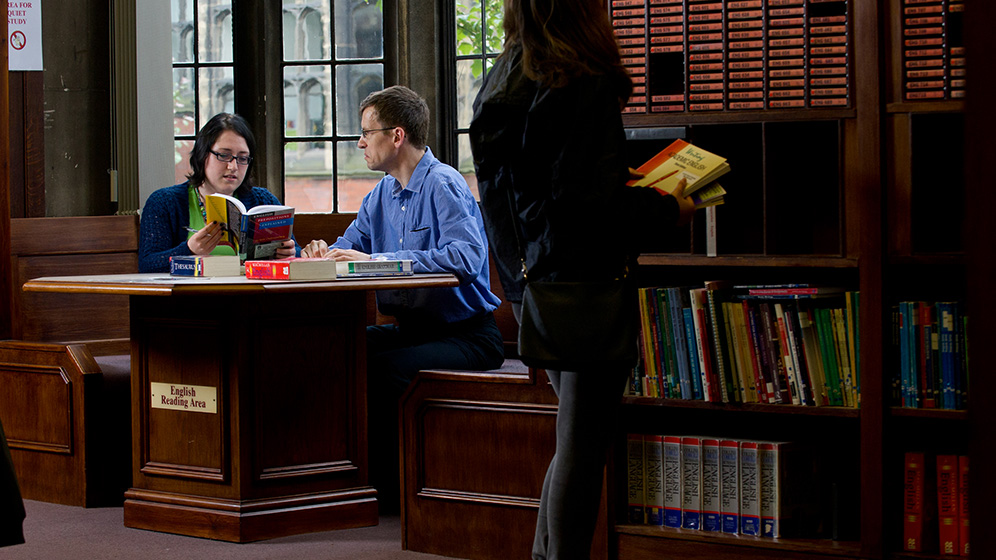Politics and International Relations BA Honours
- UCAS code: L290
- Full time
- 3 years
Combine the best of our Politics and International Relations degrees to launch your career with an impressive blend of skills and expertise.
You are currently viewing course information for entry year: 2026
Next start date:
- September 2026
UCAS Institution name and code:
- NEWC / N21
Course overview
This flexible degree will train you to understand the political ecosystem within and between individual countries – preparing you to succeed in any career that requires the skilled analysis of complex material and the ability to draw clear-minded, evidence-based conclusions.
You will join a close-knit community of students and staff that creates an environment in which you can flourish. Our academic staff will bring political issues alive for you. Our expertise covers all aspects of politics as a discipline, so you can study a range of topics taught by acknowledged experts in their field.
Starting with a solid grounding in systems of government, political theory and world politics, you can tailor your degree through specialist modules on topics such as inequality and justice, environmental politics, and international security.
Your course and study experience - disclaimers and terms and conditions
Please rest assured we make all reasonable efforts to provide you with the programmes, services and facilities described. However, it may be necessary to make changes due to significant disruption, for example in response to Covid-19.
View our Academic experience page, which gives information about your Newcastle University study experience for the academic year 2025-26.
See our terms and conditions and student complaints information, which gives details of circumstances that may lead to changes to programmes, modules or University services.
Quality and ranking
Professional accreditation and recognition
All professional accreditations are reviewed regularly by their professional body.
Modules and learning
Modules
The information below is intended to provide an example of what you will study.
Most degrees are divided into stages. Each stage lasts for one academic year, and you'll complete modules totalling 120 credits by the end of each stage.
Our teaching is informed by research. Course content may change periodically to reflect developments in the discipline, the requirements of external bodies and partners, and student feedback.
Featured module
POL2090 : Equality, Diversity, and InclusionExplore questions about how the social and political world ought to operate, with a particular focus on equality, diversity, and inclusion. Consider questions such as: Ought we to restrict hate speech? Should we use affirmative action policies? Should we have a basic income? You'll examine these questions by considering prominent literature in normative political philosophy

Optional module availability
Student demand for optional modules may affect availability.
Full details of the modules on offer will be published through the Programme Regulations and Specifications ahead of each academic year. This usually happens in May.
To find out more please see our terms and conditions
You will gradually develop the critical thinking, research, and communication skills required to study international relations and become an informed and engaged global citizen. You’ll gain an understanding of what it means to compare political systems as well as a solid grounding in the dynamics of the international system and in political thought. You will start to relate your studies to historical, global, national, and ideological contexts.
By the end of Stage 1, you will be able to identify the factors that shape contemporary events in the world of politics and international relations, with a growing understanding of the interrelationships between the national and the global.
Modules
You will build on the skills developed in Stage 1 as you look in greater depth at key issues, organisations, and actors in politics and international relations. You’ll develop critical insight into the relationship between theory and practice and how research methods, including comparative methods, used in the social sciences shape our understanding of both fields.
You will be able to start to tailor your degree to your interests by choosing from a range of optional modules, covering key issues such as security, development and justice.
By the end of Stage 2, you will have the knowledge and skills needed to analyse how problems in politics and international relations are created, defined, and potentially solved.
Modules
| Compulsory Modules | Credits |
|---|---|
| Becoming a Political Researcher | 20 |
| Equality, Diversity, and Inclusion: Social Issues in Contemporary Political Philosophy | 20 |
In Stage 3, you can begin to specialise in the areas of politics and or international relations that are of interest to you. As a part of this you will undertake a significant piece of independent research that harnesses your subject knowledge and the research skills you’ve developed throughout your degree.
You’ll complete your study with optional modules covering topics across international relations, comparative politics, and political theory. By the end of Stage 3, you will be a keen analyst of international relations who is able to identify, assess, analyse, and evaluate global issues with critical insight and methodological sophistication.
In addition, you’ll complete your study with optional modules covering topics across international relations, comparative politics, and political theory.
Modules
You will choose at least 20 and not more than 60 credits of modules from the following list:
You will take 60 credits of modules from the following:
*Permission to take this module is subject to approval of the Degree Programme Director
**Not available if you have previously taken Regional and International Organisations module
If you did not take an International Study Year module you can take one of the following modules subject to agreement from the Degree Programme Director.
| Optional modules | Credits |
|---|---|
| Student Exchange: Semester 1 | 60 |
| Student Exchange (Dissertation Students) | 40 |
We base these figures and graphs on the most up-to-date information available to us. They are based on the modules chosen by our students in 2024-25.
Teaching time is made up of:
- scheduled learning and teaching activities. These are timetabled activities with a member of staff present.
- structured guided learning. These are activities developed by staff to support engagement with module learning. Students or groups of students undertake these activities without direct staff participation or supervision
Teaching and assessment
Teaching methods
You will benefit from our strong focus on teaching quality. This translates into engaging modules, delivered through a stimulating variety of lectures, seminars, teamwork activities, research projects and simulation exercises.
Assessment methods
You'll be assessed through a combination of:
-
Case studies
-
Dissertation or research project
-
Essays
-
Examinations – practical or online
-
Group work
-
Interviews
-
Portfolio submission
-
Projects
-
Reflective report/journal
Skills and experience
Practical skills
You will be trained to conduct interviews, evaluate surveys and statistics. You'll get training in R, a world-leading free statistical software that helps you to understand data, analyse trends, and make informed recommendations.
Business skills
Your degree will have a practical real-world focus throughout.
You will be able to put your learning into practice further by conducting real-world political research for a local organisation (including Newcastle City Council) in Stage 3.
Research skills
In Stage 3, you will have the chance to produce a dissertation or report based on a piece of your own independent research. You will be given hands-on training in advance on the design, methodology and implementation of your research, including both qualitative and quantitative analytical techniques.
Opportunities
Work placement
Get career ready with a work placement and leave as a confident professional in your field. You can apply to spend 9 to 12 months working in any organisation in the world, and receive University support from our dedicated team to secure your dream placement. Work placements take place between stages 2 and 3.
You'll gain first-hand experience of working in the sector, putting your learning into practice and developing your professional expertise.
If you choose to take a work placement, it will extend your degree by a year, and your degree title will show you have achieved the placement year. A work placement is not available if you're spending a year studying abroad. Placements are subject to availability.
Find out more about work placements
Study abroad
Experience life in another country as part of your degree. Enrich your experience by studying at one of our partner universities in Australia, Canada, Europe, Hong Kong and the USA, among others. Embrace fun and challenging experiences, make connections with new communities, and graduate as a globally aware professional.
You may choose to spend semester 1 or the full academic year of Stage 3 on an international exchange at a partner institution.
Facilities and environment
Facilities
You'll be based in the School of Geography, Politics and Sociology's Henry Daysh Building.
Support
You will have one-to-one academic and pastoral support from a personal tutor and from a student.
A tutor in the department has twice won a student-nominated award for pastoral care in recent years.
Your future
Upon graduation you'll be able to think critically, assess complex material and data, carry out research, and construct well-informed arguments.
Our graduates have used these skills to progress into careers in politics, economics, and international relations, for employers such as:
- the Houses of Parliament
- HM Treasury
- local government
- the Civil Service
- inter-governmental organisations
- public affairs consultancies
Others have applied their skills with equal success in industries such as:
- media
- law
- business and finance
- management consultancy
- education and academia
- human resources
- marketing
Read what our graduates have to say about studying Politics at Newcastle University
Make a difference
Sorry, you need JavaScript to view this video
Careers support
You'll benefit from targeted careers support throughout your degree. In your induction week, you'll explore potential career paths.
In Stage 2, you can apply for a work placement with a local political party or charity. In Stage 3 you can boost your prospects by conducting policy research on behalf of a local community organisation.
Our Careers Service is one of the largest and best in the country, and we have strong links with employers. We provide an extensive range of opportunities to all students through our ncl+ initiative.
Visit our Careers Service website
Recognition of professional qualifications outside of the UK
If you’re studying an accredited degree and thinking about working in Europe after you graduate, the best place to find current information is the UK Government’s guidance on recognition of UK professional qualifications in EU member states. This official resource explains whether your profession is regulated in another country, what steps you need to take, and which organisation you should contact.
Entry requirements
All candidates are considered on an individual basis and we accept a broad range of qualifications.
The entrance requirements and offers below apply to 2026 entry.
| A-Level | |
|---|---|
| International Baccalaureate | |
|---|---|
Other UK and the Republic of Ireland qualifications
Alternative offers at Newcastle
Through one of our contextual or alternative offer routes, you could receive an offer of up to three grades lower than the typical requirements.
Contextual offers
We use certain contextual data from your UCAS form, alongside your application, to consider challenges that you may have faced in your education and the potential effect this may have had on your qualifications. This means you may be eligible to receive a lower contextual offer.
PARTNERS offers
One of the largest and longest support entry routes to university of its kind for students from underrepresented backgrounds. We support applicants from application through to study.
Realising Opportunities offers
A unique programme delivered in collaboration with 10 leading, research-intensive universities in the UK. The programme is open to students in Year 12/first year of college.
Pathways to Newcastle offers
Pathways to Newcastle, our national skills entry route, is available for specific subject areas.
High Performance Athletes
We support promising athletes at the application stage, who compete in regional, national or international levels in their sport.
Qualifications from outside the UK
English Language requirements
Entrance courses (INTO)
International Pathway courses are specialist programmes designed for international students who want to study in the UK. We provide a range of study options for international students in partnership with INTO.
These courses are specifically designed for international students who want to study in the UK and progress onto one of our undergraduate degrees. Our International Study Centre, has a range of study options including:
- International Foundation
- International Year One
- English Language courses
Find out more about International Pathway courses
Admissions policy
This policy applies to all undergraduate and postgraduate admissions at Newcastle University. It is intended to provide information about our admissions policies and procedures to applicants and potential applicants, to their advisors and family members, and to staff of the University.
University Admissions Policy and related policies and procedures
Credit transfer and Recognition of Prior Learning
Recognition of Prior Learning (RPL) can allow you to convert existing relevant university-level knowledge, skills and experience into credits towards a qualification. Find out more about the RPL policy which may apply to this course.
Tuition fees and scholarships
Tuition fees for academic year 2026-2027
The 2026 entry home fees have not yet been confirmed.
| Qualification: BA Honours | |
|---|---|
|
Home students full time 3 years |
Tuition fees (Year 1)
Not set |
|
International students full time 3 years |
Tuition fees (Year 1)
24,500 |
Year abroad and additional costs
For programmes where you can spend a year on a work placement or studying abroad, you will receive a significant fee reduction for that year.
Some of our degrees involve additional costs which are not covered by your tuition fees.
Scholarships
Find out more about:
Open days and events
You'll have a number of opportunities to meet us throughout the year at our on-campus and virtual open days.
You'll be able to:
- explore our beautiful campus
- find out about our vibrant city
- discover what students think about studying at Newcastle
You'll also have the opportunity to speak to academic staff and find out more about the subjects you're interested in.
Find out about how you can visit Newcastle in person and virtually.
We regularly travel overseas to meet with students interested in studying at Newcastle University. Visit our events calendar to find out when we're visiting your region.
How to apply
Apply through UCAS
To apply for undergraduate study at Newcastle University, you must use the online application system managed by the Universities and Colleges Admissions Service (UCAS). All UK schools and colleges, and a small number of EU and international establishments, are registered with UCAS. You will need:
- the UCAS name and institution codes for Newcastle University (NEWC/N21)
- the UCAS code for the course you want to apply for
- the UCAS 'buzzword' for your school or college
If you are applying independently, or are applying from a school or college which is not registered to manage applications, you will still use the Apply system. You will not need a buzzword.
Apply through UCASApply through an agent
International students often apply to us through an agent. Have a look at our recommended agents and get in touch with them.
Get in touch
By phone
Call us on +44 (0) 191 208 3333 and press option 1. Our opening hours are Monday to Friday 10am until 4pm.
Live chat
Our NCL chatbot might be able to give you an answer straight away. If not, it’ll direct you to someone who can help.
You'll find our NCL chatbot in the bottom right of this page.
Online
Keep updated
We regularly send email updates and extra information about the University.
Receive regular updates by email










